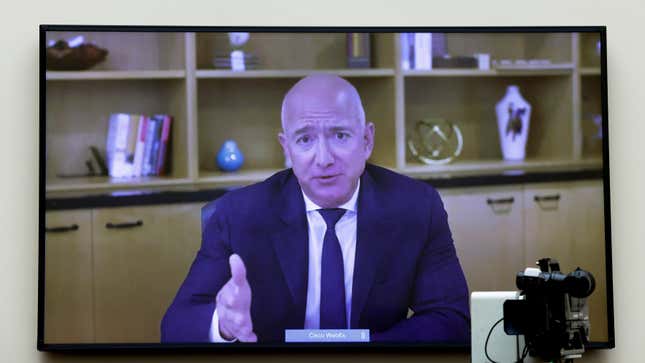
This has been the year Amazon has gone hard on climate. As part of that effort, the company announced new climate commitments, a fund to invest in sustainable technology, and hockey arena naming rights.
The fund, dubbed the Climate Pledge Fund, announced its first investments on Thursday. The companies include CarbonCure, Pachama, Redwood Materials, Rivian, and TurnTide. We can talk about what they do in a minute, but most important is who they do it for: All the companies are already working with Amazon in some capacity. It neatly illustrates the dangers of private business rushing to fill the gap of climate action left by governments.
We’ve talked here before about how the fund poses a danger by only focusing on emissions rather than human rights, how hostile Amazon has been to climate organizers internally, and the company’s hypocrisy of continuing to hock its services to oil and gas exploration. But seeing how it’s deploying its Climate Pledge Fund opens a new, worrying front. Amazon has a right to spend its money however it so pleases. The problem is that it has so much money and influence, putting it in a position to reshape the world in its image in the first place.
So about those companies it’s investing in. CarbonCure removes carbon dioxide from the atmosphere, including a process to stash it in cement. Pachama is a company that uses AI to vet nature-based solutions to store carbon. Redwood Materials recycles lithium-ion batteries and e-waste. Rivian is an electric vehicle manufacturer. And finally, TurnTide Technologies creates optimized motors to improve efficiency.
None of these are inherently bad things, and in fact, many are good! We need more electric vehicles and carbon dioxide removal absolutely has to scale. The basic idea of Amazon decarbonizing is good, and in fact, every facet of every industry needs to do it, full stop. Carbon markets are another thing, but that’s for another day (or you could just read this). The real thing I want to get at here is what this represents: the Amazonification of climate action.
Governments have left a huge hole in the world by failing to regulate emissions. They’ve also shirked their duties to tax corporations and the wealthy, which may not sound like a climate policy issue but is.
Now, as we stand on the brink of a crisis, that inaction has opened the door for private companies to step in and act unilaterally, beholden to a slim sliver of shareholders rather than an informed democracy. It’s possible governments will make up some ground in funding innovative breakthrough technologies—scholars laid out two plans for how the U.S. could do just that this week—and maybe even start to tax huge companies that have sent inequality skyrocketing. But in the meantime, Amazon, along with a few other moonshot funders in Silicon Valley like Y Combinator, is using its vast fortune to fill the void funding innovation.
The stakes Amazon is buying in these companies will help them gain a competitive advantage and could, if these companies become commercially successful, pay huge dividends back to the company. We may accrue public benefits of lower emissions, but Amazon will reap massive profits that will allow it to gain even more of a monopoly on our lives and set the rules the rest of the world plays by.
In late 2019, former Gizmodo editor Adam Clark Estes outlined a few ways you could escape Amazon’s sphere of influence by buying less stuff from the company or not purchasing the companies’ surveillance devices like Alexa and Ring. But the pandemic has allowed Amazon to reach ever further into lives while vastly enriching Jeff Bezos. He’s added $73 billion to his already voluminous fortune, or more than seven times as much as he’s committed to climate philanthropy separate from Amazon’s Climate Pledge Fund. The public health crisis was a business opportunity, and it’s clear the company views the climate crisis similarly.